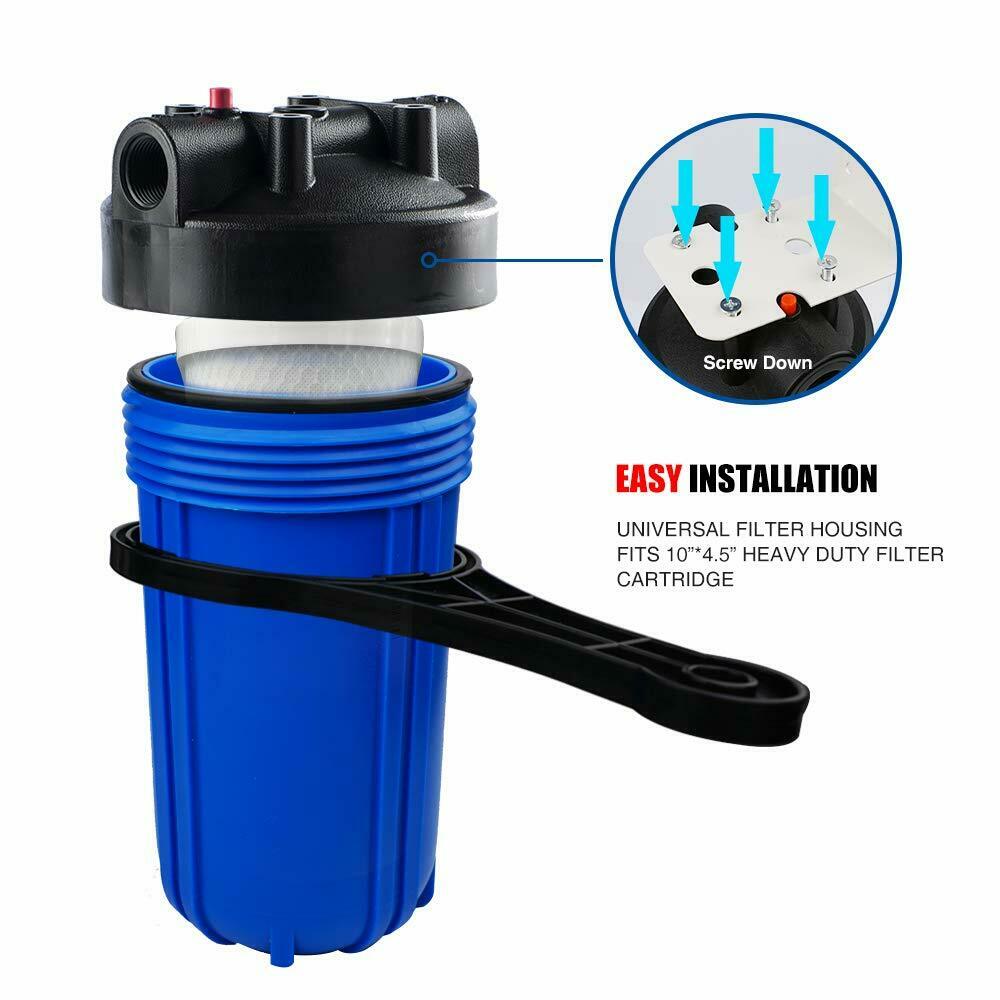Table Of Content

The more often a softener regenerates, the more salt it uses and the more water it wastes. These cartridge systems, such as those offered by Pro Aqua and GE, are touted for being inexpensive and effective whole-house filtration solutions. It’s true they are effective, but only if you remember to change filters every six months. These filter replacements are more expensive than the media used in the CF1, so after just a few years, a cartridge system is actually more expensive than the CF1.
How Does a Whole House Water Filtration System Work?
Most well water requires some sort of filtration, but you don’t necessarily need a whole-house filter for well water. While it’s preferred, you could also install a point-of-use water filter that delivers clean drinking water to one tap in your home. They are generally less expensive but also require you to remember to only drink from that one location.
Whole House Water Filter Reviews
If you have any concerns or want expert advice on installing a whole house RO system, the company has a toll-free number for all inquiries. Overall, the Crystal Quest whole house RO system is one of the best on the market, and it’s an excellent option for all types of well water. If you’re someone who thinks they want to create a DIY whole-house water filter to save a few dollars then make sure you are ready to deal with the hassles that come with that process.
Pelican Iron & Manganese Well Water Filter
The greensand filter, which eventually becomes saturated with iron, sulfur, and manganese particles, is automatically flushed on a regular basis. The electronic controller installed at the top of the unit measures water use and initiates the flushing cycle so you don’t have to. Lastly, since the WS1 uses an improved type of greensand, it lasts much longer. Traditional iron, sulfur, and manganese filters rely on a number of nasty chemicals.
The 7 Best Water Softeners of 2024 - Better Homes & Gardens
The 7 Best Water Softeners of 2024.
Posted: Fri, 28 Jul 2023 16:25:13 GMT [source]
The Best Water Distillers for Clean Drinking Water

Capacity is the volume of water a filter can treat before it becomes saturated with contaminants. We usually see this expressed in gallons, but some manufacturers provide a suggested timeframe as well. NSF certification ensures that your water filtration system meets rigorous safety and construction standards.
GE Water Filtration System Filters

Most RO systems are the point of use devices meaning they are installed under the sink and only provide filtered water to one point in your home. On the other hand, the filter for well water we reviewed provides filtered water to your whole house. A standard well water filter requires more maintenance because you will have to replace the filters while a system with air injection oxidation requires little maintenance and works great on well contaminants. For example, a high-powered iron filter would be useless to you if your well water isn’t high in iron, whereas a carbon filter won’t do you much good if your well is only full of metals. Chlorine and UV light are commonly-used disinfectants that kill the bacteria in your water, while gravity-fed filters and reverse osmosis filters will remove them completely. This all-in-one well water filtration system is compact and streamlined, and you have several different options for the filter cartridge so that you can choose the one that best fits your home.
Reviews in Tech & Electronics
Lastly, the water passes through a 36-watt UV lamp to kill the DNA of any microbes to kill them instantly and ensure your water is free from microscopic bugs that can make you sick or worse. However, if your water has tested positive for microbes, you should have both your well and your septic tank evaluated for cracks and leaks so that you can begin working on a long-term solution. Some whole house water filters have just one filtration method, but there are some that use multiple stages of filtration to ensure different contaminants can be caught. Often water filters with multiple stages begin with larger materials like sand, dirt, and sediment. Then, they’re often filtered again with UV or infrared filtration to remove chemicals, fungi, and bacteria.
The water needs to be shut off to the entire house, the lines need to be drained, and the user will typically need to cut the water pipe and install a set of fittings suitable for the filter. It’s advised to have a professional plumber or water filter installation technician install the water filter unless you have experience with plumbing, including both cutting and soldering new plumbing fittings. To help accommodate the needs of the entire home, most whole-house water filtration systems have a high water flow rate, ranging from 10 to 25 GPM. However, some systems have lower flow rates and others have higher ones. These water filters use a replaceable cartridge to remove contaminants ranging from 0.04 to 500 microns. Cartridges can include sediment filters, heavy metal filters, organic chemical filters, and more.
The WS1 can remove a ton of sulfur and iron, but some wells do have more of these contaminants than the WS1 can handle. There are also filters that use UV (ultraviolet) light, which destroys bacteria without heat or chemicals, using UV radiation. Our pick for the best UV filter is the PENTAIR PUV-14 Whole House Water Treatment & Disinfection System. City water is supplied by your local municipality and is typically treated with chlorine before it reaches you, which can leave behind a taste or leave your hair and skin feeling dry. Since 2015, Jenn Ryan has been a freelance writer with a focus on natural health, eco-friendly products, and wellness.
Specifically, it removes up to 95% of iron, manganese, sediment, and chemicals. If you’re on municipal water and chlorine is your biggest concern, you can stick with the 2 CTO filters. If you’re concerned about lead, you can replace one of the CTO filters with an ion-exchange lead reduction filter. Overall, it’s a decent whole-home filtration system for someone looking for a lower-cost option to remove chlorine and chloramines. It’s a great option for individuals who are concerned about chlorine, heavy metals, or other pollutants in their water and want the freedom to construct their own solution. The pre-filter lasts up to six months with city water, while the post-filter lasts up to 12 months on city water.
Filter lifespan & capacity – The capacity is based on the carbon filter, which is slightly lower than the other models at 95,000 gallons. It can still last you a full year in a 4-person household if you only have moderate usage, however. The Aquasana whole-house water filter is a great choice for customers who are looking for a three-stage water filter system that also serves as a whole-house water softener.
The system includes two RO membranes, a sediment filter, a carbon block filter, a water pump, float switches, and a 550-gallon holding tank. There are also options to buy the system standalone, with a 165-gallon tank or a 220-gallon tank. Be sure to consider the size of your household and where you plan to feed the water to get an accurate idea of your household’s daily consumption rate.
But a softener that doesn’t use salt isn’t a softener at all because it doesn’t remove calcium and magnesium. Instead, it transforms these minerals so they don’t stick to your pipes, appliances, fixtures, etc. This does eliminate scale buildup, but it does not affect the other annoyances of hard water, such as poorly lathering soap, streaks and stains on your dishes and glasses, and that dry, sandpaper feeling on your skin. It does this using a four-stage filtration process that allows for more-effective contaminant removal than traditional two- or three-stage filters. The first stage includes a sponge-like material (known as a flex-bed) that distributes water over the entire filter media to increase contact time with all filters and improve filtration.
While RO and carbon filters can address coliforms, they may not fully safeguard against microorganisms like E. If you don’t regularly test your well water, you’re at risk of ingesting harmful minerals in your everyday drinking water. Knowing the exact content in your well water will give you peace of mind that it’s safe to drink. ISpring’s whole house water filter system for wells removes problem contaminants in well water with ease. In essence, filters are designed to filter different things out of the water. Some filters, such as carbon block filters, are really good at catching a lot of different contaminants.

No comments:
Post a Comment